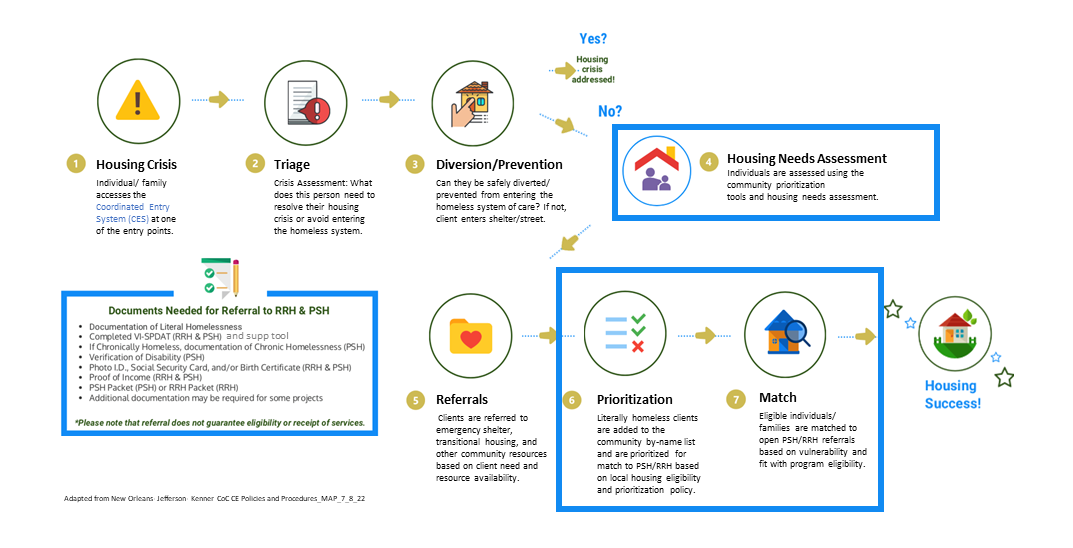Charlotte-Mecklenburg’s Coordinated Entry System
Megan Coffey
Coordinated Entry Supervisor
Mecklenburg County
Community Support Services
Mary Ann
Priester
Senior Management Analyst
Mecklenburg County
Community Support Services
From July 2023 – September 2023, 1637 people (including children) had a Coordinated Entry Housing Needs assessment via a local Coordinated Entry System access point. Coordinated Entry Systems (CESs) are designed to streamline access to services and housing resources, reduce homelessness, and ensure that resources are allocated fairly based on need. The local CES is a collaborative effort between local government agencies, non-profit organizations, and community partners dedicated to addressing homelessness in a coordinated and efficient manner.
This blog provides an overview of Coordinated Entry, what it is and is not, and how persons in need can access the local coordinated entry system.
WHAT IS COORDINATED ENTRY?
A Coordinated Entry System (CES) is a comprehensive approach used to address and manage homelessness by creating a centralized, organized, and standardized system for individuals and families seeking housing and supportive services. The Department of Housing and Urban Development (HUD) developed the coordinated entry system and process to ensure that all people experiencing a housing crisis have fair and equal access to be assessed, referred, and connected to housing assistance based on their strengths and needs. HUD asks communities to “strategically allocate their current resources and identify the need for additional resources” and to operate person-centered coordinated entry systems that “prioritizes people who are most in need of assistance”.
Key characteristics of a Coordinated Entry System include:
Centralized Access Point: CES starts with a centralized location or access point where individuals and families can seek assistance, request assessments, and access information about available resources.
Standardized Assessment: A standardized assessment tool is used to gather information about the needs, vulnerabilities, and characteristics of people seeking housing and services. This assessment helps determine their priority for assistance.
Prioritization: Based on the assessment, individuals and families are prioritized for housing and services according to their level of vulnerability and need. Those who are the most vulnerable or at risk of harm are typically prioritized for housing resources.
Referral and Matching: The CES matches and refers individuals and families to appropriate housing and service programs based on their assessment results and prioritization. This may include emergency shelter, transitional housing, rapid rehousing, or permanent supportive housing, depending on their needs.
Data Management: The local Coordinated Entry System relies on data collection and management to track the number of people experiencing homelessness, monitor the progress of individuals and families, and evaluate the effectiveness of the system. This data helps systems to allocate resources efficiently and make improvements as needed.
Case Management and Support Services: A CES often includes case management services to help individuals and families navigate the system, access resources, and address any barriers to obtaining stable housing. Supportive services may also be offered, such as mental health counseling, addiction treatment, employment assistance, and other services to help people maintain stable housing.
Housing First Approach: The Charlotte-Mecklenburg CES system embraces the “Housing First” philosophy, which prioritizes getting people into stable housing quickly and then addressing underlying issues, such as mental health or substance abuse, as needed.
CHARLOTTE-MECKLENBURG COORDINATED ENTRY SYSTEM
Individuals who are experiencing homelessness or are at imminent risk of homelessness can access the Coordinated Entry System via the Coordinated Entry hotline and onsite at various partner agency locations. For those that call the Coordinated Entry hotline, staff persons provides a return call to all callers within 2 business days to conduct a Coordinated Entry Housing Needs Assessment to collect additional information about a household’s situation. Based on the information provided, the Coordinated Entry assessor will provide resource information and referrals to available programs individuals might be eligible for such as emergency shelter, street outreach, and financial assistance to prevent homelessness.
While a Coordinated Housing Needs Assessment is an important first step in connecting to homeless services in Charlotte-Mecklenburg, having an assessment does not provide an immediate resolution to a household’s housing crisis.
The Charlotte-Mecklenburg Coordinated Entry System CAN:
- Provide friendly, compassionate service and a listening ear.
- Assist in identifying resources.
- Assist in generating creative solutions.
- Provide referrals to which you are eligible to shelters, outreach, diversion, and prevention, if available.
The Charlotte-Mecklenburg Coordinated Entry System CANNOT:
- Provide immediate emergency financial assistance.
- Provide a discharge plan for individuals exiting an institution such as a hospital or jail.
- Provide motel vouchers.
- Provide housing vouchers or low-income housing.
- Provide immediate shelter (some shelters have waitlists).
- Provide transportation, bus passes or moving services.
- Act as landlords, housing providers or housing navigators.
SO WHY DOES THIS MATTER?
Mecklenburg County is the Lead Agency for the Coordinated Entry System of the Charlotte-Mecklenburg Continuum of Care. If you or someone you know are experiencing homelessness or may be homeless soon, Coordinated Entry is the first step to connect to homeless services and homelessness prevention resources in Mecklenburg County. The Coordinated Entry Hotline can be reached at (704) 284-9665. If you are an agency that serves people experiencing homelessness and would like more information about Coordinated Entry, please contact Megan Coffey at Megan.Coffey@MeckNC.gov.


